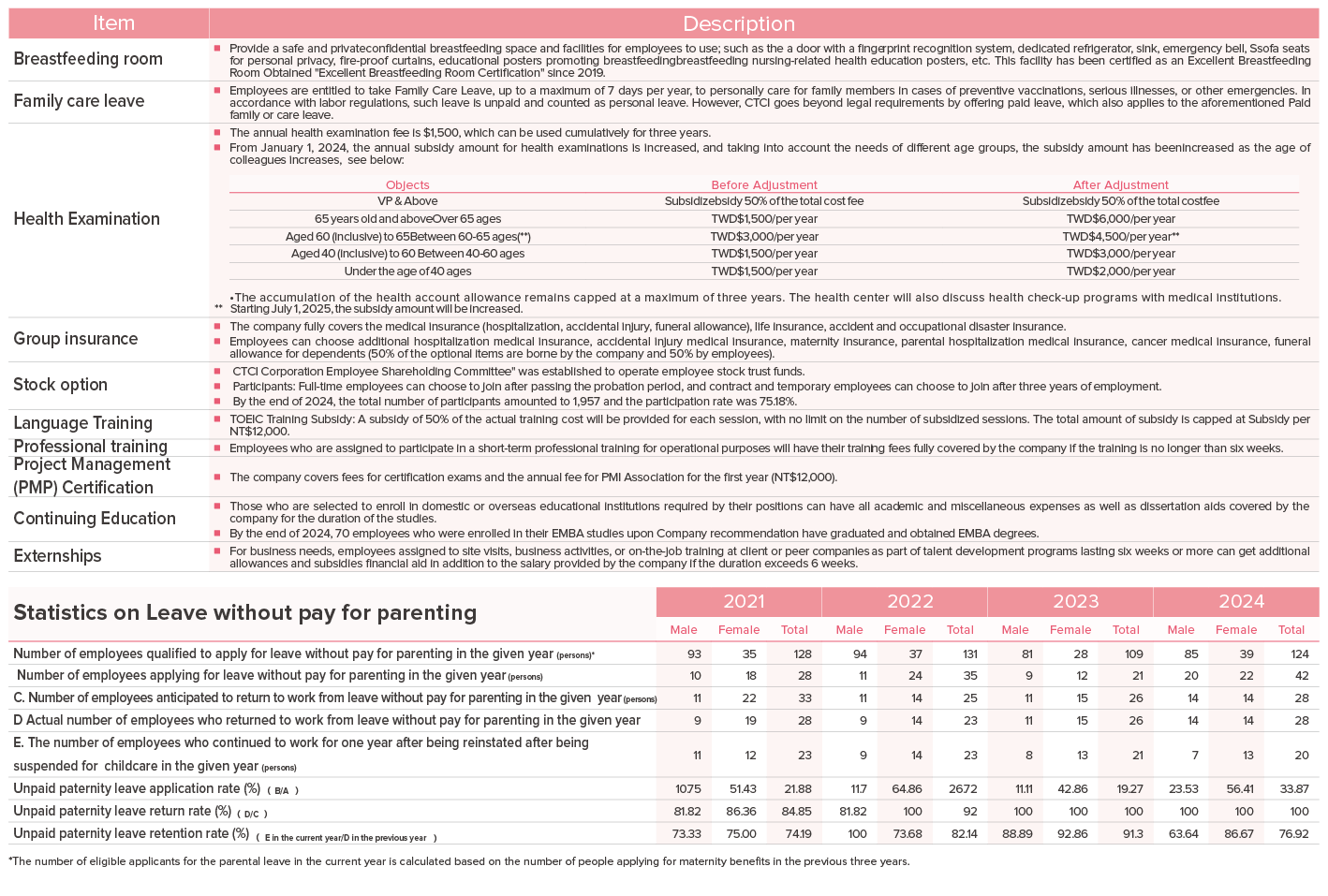Talent Development

Talent Recruitment and Retention
Talent Recruitment
Employees have always been the company's most valued and prized assets and are also the strongest support in promoting engineering services of CTCI internationally. With the culture of "Professionalism, Integrity, Teamwork and Innovation", CTCI is committed to providing talents with a friendly and healthy workplace where they can learn, grow, and build their dream career. CTCI has no gender bias in talent selection process. Academic capability, collaborative attitude, and suitability of the working culture are the three essential focuses in our recruitment procedure. With CTCI's growth in business, global talents have been recruited through diverse channels such as collaborations with industries and academia, overseas recruitment and recruitment websites (LinkedIn, etc.). In 2023, there were 857 new recruits, which accounted for 24.89 % of CTCI's total number of employees. Among the new employees, 51.93% were under the age of 30. CTCI has recruited a total of 2,262 new talents in the past four years and have been continuously contributing to the innovation and vitality of the Company.
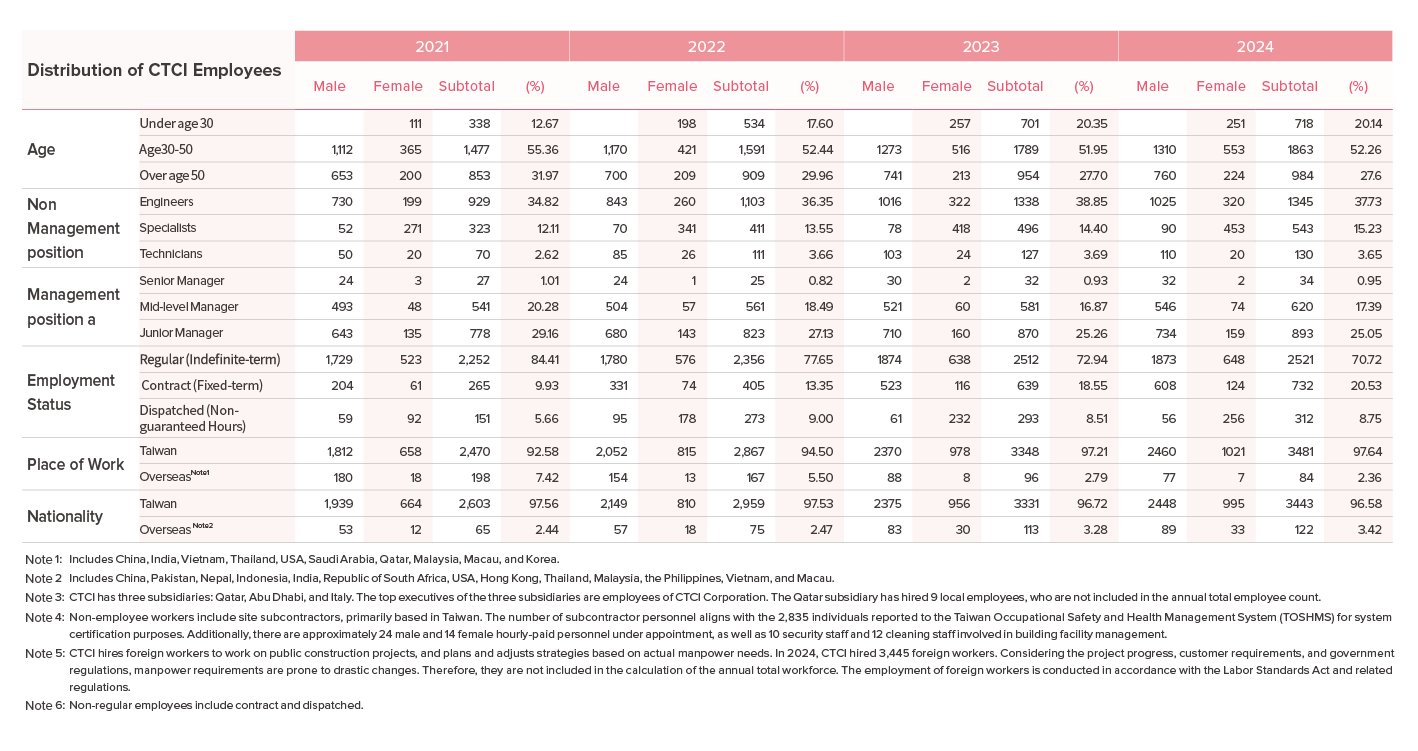
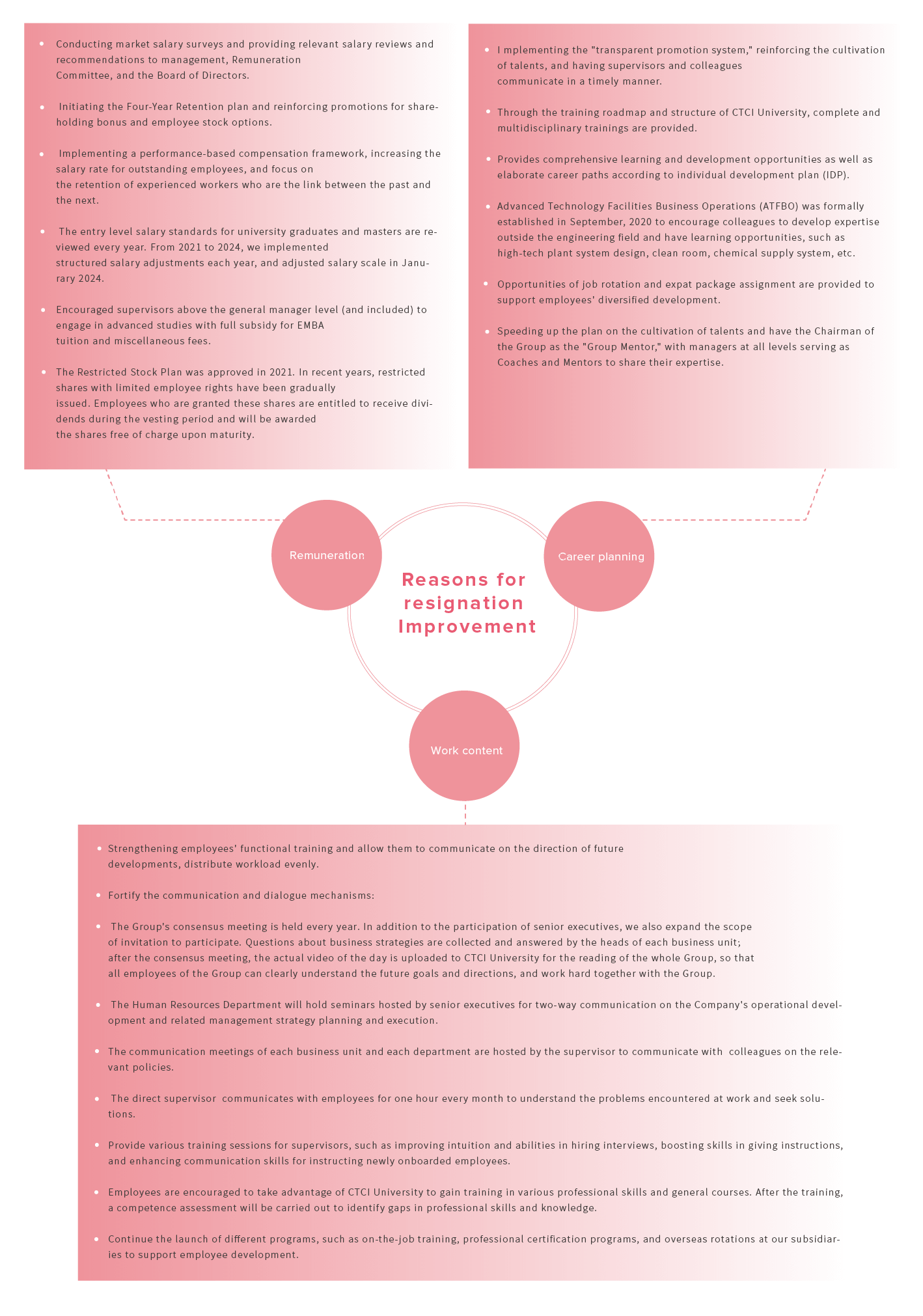
The overall turnover rate in 2023 is 6.62 %. As the number of voluntary resignations decreased compared with the previous year and the total number of employees increased, the turnover rate also dropped significantly from the previous year's 9.75%. Among the employees who resigned, the engineer grade had the highest turnover rate. Meanwhile, it was found that 11.44 % of newly recruited employees in 2023 applied for a resignation within a year of employment. The resignation of contract and temporary employees was due to the manpower required according to the progress of the project, Manpower required for such operation process of the engineering services was unstable and unpredictable. For full-time employees, the human resources unit would look deeper into the reasons for their resignation by carrying out a resignation analysis report, conducting a survey on employee resignation, and face-to-face communications. In summary, it has been found that remuneration and benefits, career development, and job content are the main reasons for employees' resignation. In order to retain outstanding talents, in addition to the the four-year retention measure, we have further planned a restricted stock program, hoping to retain more talents, and through differentiated management and promotion measures, allow outstanding talents to learn quickly, pay differentially, rotation experience, domestic EMBA and foreign further study topics, etc. implement comprehensive training and talent retention measures. The performance appraisal system is divided into A (Potential correlated with annual salary adjustment) and B (Performance Evaluation correlated with year-end performance bonus), which can further distinguish the performance of colleagues. For the top 5 % employees, the salary of outstanding employees of each operating unit will be adjusted significantly in addition to the existing salary adjustments and bonuses. A "horizontal" evaluation meeting hosted by the chairman will also be held to discuss promotion, salary adjustment, and career planning for colleagues with outstanding performance of each operating unit, increase the centripetal force of outstanding colleagues and drive positive competition and influence among peers.
Employee Distribution
As of 2024, the total number of employees were 3,565 people (excluding other related companies in the Group), of which 2,537 were males and 1,028 were females. The ratio of female to male employees was 1:2.47, reflective of the characteristics of the engineering services industry. The majority of the age group ranged from 30 to 50. More than half of the total employees (47.46 %) have worked at CTCI for more than five years, providing a solid foundation for technical knowledge transfer and business expansion, while playing a key role in project execution and technological innovation. In terms of their educational level, about half of the employees (41.85 %) have a Master's degree or above, show CTCI places great importance on the development of professional knowledge and skills.
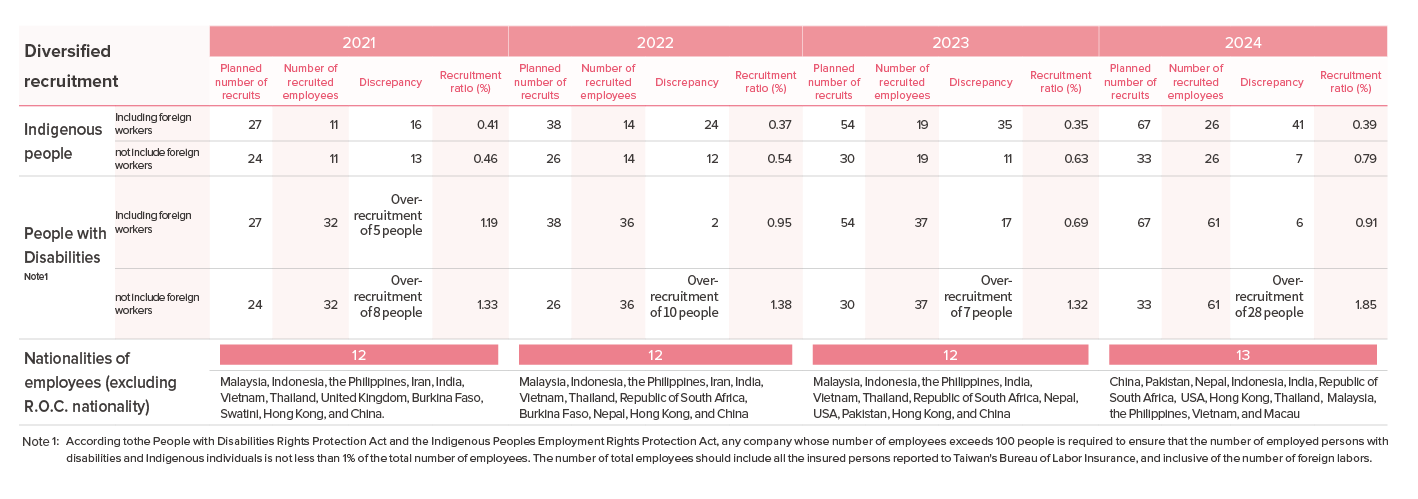
DEI (Diversity, Equity, andInclusion)
CTCI is committed to fostering a diverse and inclusive workplace, promoting diversity across gender, religion, ethnicity, nationality, age, and minority groups. By fostering diverse perspectives, the Company drives innovation and growth. Our global projects span across locations such as Beijing, Shanghai, Vietnam, Thailand, India, the United States, Oman, and Saudi Arabia, actively employing local professionals to demonstrate our respect for multiculturalism. As of 2024, CTCI’s workforce includes employees from 13 different nationalities, and over 90% of staff at overseas subsidiaries are local hires. The Company actively cultivates local talent to assume management positions, thereby promoting local economic development and strengthening its global presence. At our Taiwan headquarters, 97.06% of senior executives are Taiwanese nationals. We are also committed to workplace diversity by employing 26 indigenous employees and 61 persons with disabilities, 54.05% of whom serve in entry- to mid-level supervisory roles. CTCI will continue to promote a culture of diversity and inclusion, ensuring all employees can thrive in a fair and equitable environment. Through localization strategies and talent development, we aim to enhance our competitiveness and support sustainable global growth.
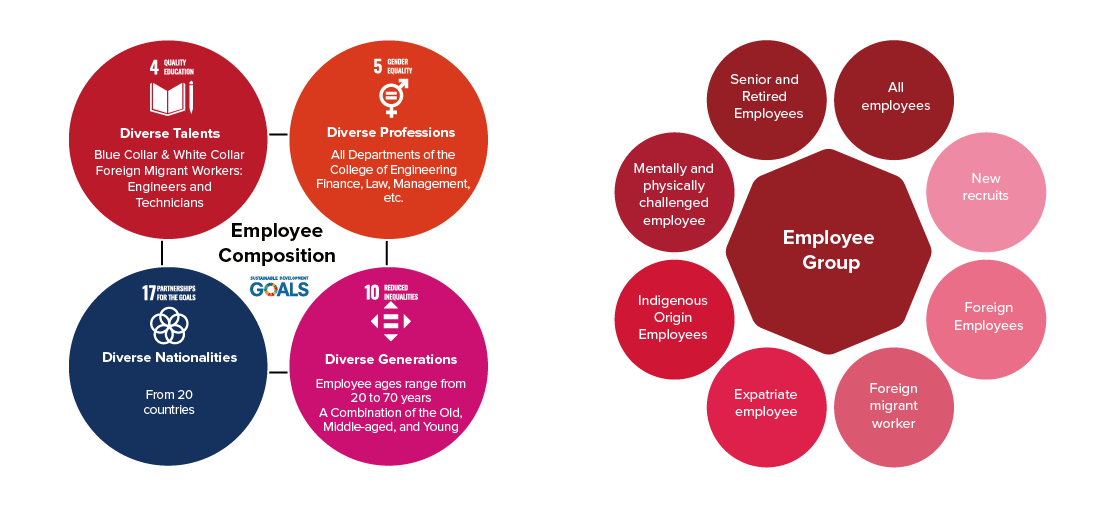
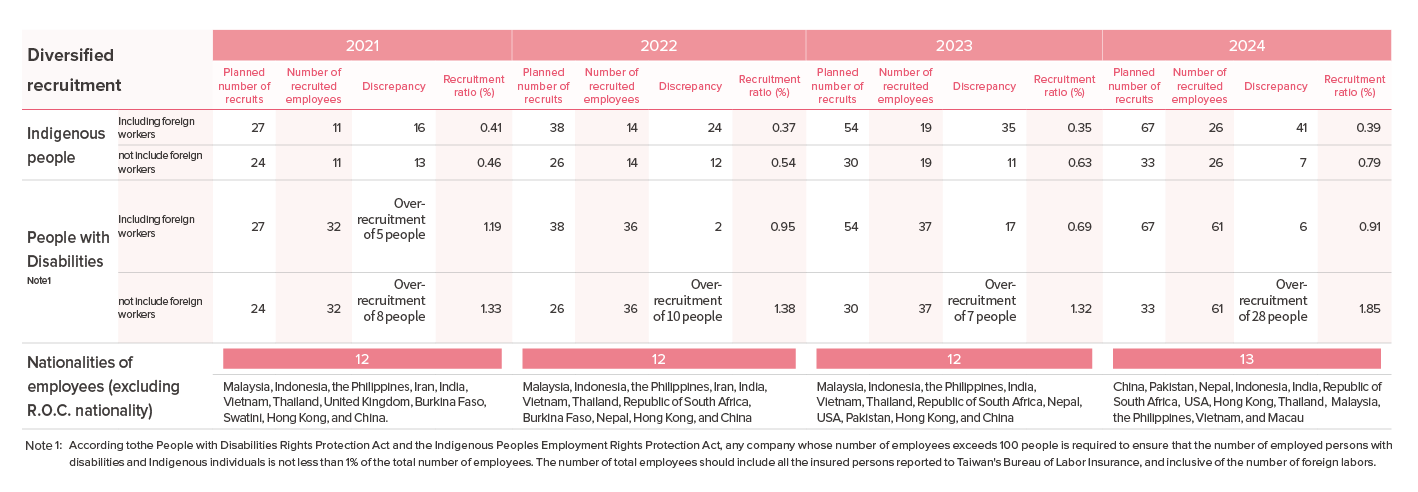
Percentage of Supervisors Who Are Foreign Employees (%)
CTCI adheres to the principle of merit-based employment, recruiting professional talent with an open and diverse attitude, regardless of gender. While the nature of the industry results in a higher proportion of male employees, we are committed to providing equal opportunities in the workplace and actively promoting gender diversity. To this end, we disclose the proportion of female employees at all levels and establish specific long-term goals to actively support gender equality and the development of female leadership. For example, the Group's Chief Risk Officer serves as the Chairperson of the Women's Engineer Committee of the Chinese Institute of Engineers, leading the committee to promote more opportunities for female engineers in the industry and to reduce the occupational gap between genders. CTCI continues to promote gender equality and inclusive development, striving to be a top employer that fosters a fulfilling workplace, thereby demonstrating its commitment to diversity and inclusion, and strengthening its leadership position in corporate social responsibility.
Percentage of Female Employees and Female Supervisors
Salaries and Benefits
Living Wage
The purpose of a living wage is to secure the basic livelihoods of employees so that they are able to pay for their basic living costs. In addition to complying with monthly minimum wage provision by law, CTCI takes care of colleagues and their families by providing food, clothing, housing, transportation, education, and insurance. It gives families more security so that their remuneration can stably meet the needs of family lives. Apart from considering factors such as income and expenditure, the possibility of savings needs to also be considered. Therefore, CTCI provides colleagues a shareholding trust plan. Depending on their own financial situation, colleagues can withdraw a portion from their salary every month (5 %, 10 %, or 15 %) while the Company will allocate 50 % to it. This is known as "shareholding trust account," where employees are encouraged to save and work together with the company and share the fruit of work as shareholders. Furthermore, based on the Company's performance appraisal policy, salary adjustments and bonuses are distributed according to colleagues' working performance to motivate their engagement at work. In order to encourage colleagues to integrate into the Company, employee stock option certificates have been issued, targeting all employees, as well as measures planned such as increasing the shareholding percentage of specific managers each year. For 12 consecutive years, CTCI has been incorporated into "Taiwan HC100 Index," one of the benchmark salary and compensation indices among Taiwanese companies.
External professional consultant
Each year, an external professional consultant, Wills Towers Watson, is entrusted to conduct a salary survey to understand relevant information on the external market in order to measure and maintain a certain competitive advantage in salary, which is quite helpful for the recruitment and retention of talented employees.
The Economics Report serves as a reference of the annual cost of living at various countries/cities.
Differences between work location such as urban or rural areas are taken into account to adjust the salary of colleagues around the world. This can maintain the necessary expenditure required of the local area among employees.
CTCI partnered with the Center for Corporate Sustainability of Tunghai University
The local "basic quality of living cost" and "workers' well-being" were analyzed based on the locations of employees at important operating locations, key first-tier suppliers, and contractors. They were measured in collaboration with the Center for Corporate Sustainability of Tunghai University in addition to the adoption of a proposed framework by Anker (2011), and Anker and Anker, (2017). This helps us understand the basic needs of employees, suppliers and contractors in the cost of food, clothing, housing, education, social insurance, and others (such as unexpected incidents). After formulating a living wage, in line with the characteristics of the project engineering industry, the prevailing wage will be compared with the formulated living wage to understand whether the wage is sufficient to support the local standard of living, and if it can maintain the well-being of workers in the entire engineering industry chain.
As for the remuneration system, the salary structure is determined through internal and external evaluations. The internal evaluation is conducted through assessment of job competency and positions, while the external evaluation is conducted through surveys of general wages in the current occupational market. A salary review and adjustment will be made through an assessment including job competency and performance of each employee. There is no gender distinction in salaries. Men and women with the same work responsibilities and work value receive the same wages and remuneration. All employees (including full-time, contract, and dispatch) are governed in accordance with the principle of the same salary policy. The minimum salary is higher than the basic salary according to local laws and regulations; In 2024, the minimum starting salary of male employees will be 1.11 times the basic salary, and the minimum starting salary of female employees will be 1.04 times the basic salary.

